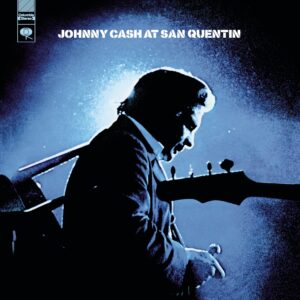January/February 2002, Good News
Popular music is usually a huge wedge driven between parents and their kids. It has always been that way and it will probably remain so. Even as progressive as I like to think of myself, I imagine that my 5-year-old son, John Paul, is going to come home in a few years listening to something that will make me reach for the sledgehammer. Enmity between the music of one generation and that of the next seems to be a fact of life. Perhaps that is one of the reasons God created Johnny Cash.
I realized this as our family made the two-day drive to Florida for Thanksgiving. While we had an eclectic variety of music, we discovered that our favorite album was Johnny Cash at San Quentin — a raucous live recording in the notorious San Quentin Prison. The prisoners were eating it up, and so were we. One minute we are chuckling to “A Boy Named Sue” and the next we were crooning along to “He Turned the Water into Wine.”
As we listened, I thought back to the days when I used to hear Johnny Cash’s gospel album in my home as a little kid. My dad loved the album Holy Land that was recorded in 1968, a few years after I was born. Here I was, listening to the rockabilly-inspired music of my father’s generation.
In all honesty, I have always loved roots music, but Johnny Cash has had a special magnetism — spanning five decades of popular culture. He is, after all, an American original with few peers.
The Man in Black — as he is known – now 69 years old, has been in and out of the hospital recently because he suffers from a nervous-system disorder known as autonomic neuropathy, which leaves him vulnerable to catching pneumonia. He could sure use our prayers.
Johnny Cash is one of the most significant patriarchs in modern American music; and definitely one of the most fascinating. Launched into fame because of hits such as “Folsom Prison Blues,” “Ring of Fire” and “I Walk the Line,” Cash has sold more than 50 million records and won 10 Grammys. He is the only person to be inducted into the Rock and Roll Hall of Fame and the Country Music Hall of Fame and the Songwriters Hall of Fame.
Cash is also an outspoken Christian who has struggled along the path with drugs, alcohol, and all the temptations of fame. Cash beat the addictions because of the power of God and the stern hand of his wife, June Carter Cash. He has written books, hosted a popular television show, starred in and produced movies (including one on Christ called Gospel Road), and has recorded 1,500 songs that can be found on 500 albums. He remains today, the crowned king of blue-collar troubadours.
I believe that Cash’s cross-generational appeal has a lot to do with the fact that he writes songs that the man on the street — or perhaps more appropriately, the guy hanging out in the alley — can understand. He loves prisoners, the working man, and the welfare mother — those found on the outskirts, those Jesus found compelling. His repertoire includes tales of injustice and stories of redemption. His recent three album collection is titled Love God Murder. What you see is what you get with Cash. He is as cool as Siberian steel.
On the liner notes of his album Unchained, he writes: “I love songs about horses, railroads, land, judgement day, family, hard times, whiskey, courtship, marriage, adultery, separation, murder, war, prison, rambling, damnation, home, salvation, death, pride, humor, piety, rebellion, patriotism, larceny, determination, tragedy, rowdiness, heartbreak, and love. And Mother. And God.”
As one reviewer of the list observed: “Except for the railroads, Cash could be describing much of what is in the Bible.”
After a time when he became more serious about his faith, Cash says it was Billy Graham who advised him to “keep singing ‘Folsom Prison Blues’ and ‘A Boy Named Sue,’ and all those other outlaw songs if that’s what people wanted to hear — and then, when it came time to do a gospel song, give it everything I had. Put my heart and soul into all my music, in fact; never compromise; take no prisoners.” Cash subsequently sang in the sold-out honky-tonks of the world and the jam-packed arenas of the Billy Graham crusades — never allowing himself to be too easily pigeonholed by the holy rollers or the heathens.
“Johnny Cash doesn’t sing to the damned, he sings with the damned, and sometimes you feel he might prefer their company,” wrote Bono of U2 on the liner notes of Cash’s three album collection Love God Murder (2000). “Johnny Cash is a righteous dude, and he keeps righteous company with June Carter Cash and the Carter Family, but it’s the ‘outlaw’ in him we love…the ‘thief’ who would break and enter your heart, and leave you with a nagging question, ‘Were you there when they crucified my Lord?’”
His song “Redemption,” found on American Recordings sets forth his gritty and elegant belief that spiritual freedom comes through the cross of Christ: “And the blood gave life to the branches of the tree, And the blood was the price that set the captives free, And the numbers that came through the fire and the flood, Clung to the tree and were redeemed by the blood.” Sometimes theologians wear black.
Cash’s mother used to tell him, “God has his hand on you. Never ignore the gift.” Thank the Lord he didn’t. We’re pulling for you, Johnny.
Steve Beard is the creator of Thunderstruck.org. This article appeared in the January/February 2002 issue of Good News.

